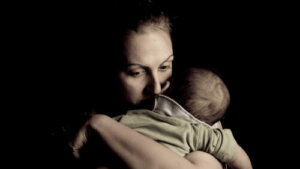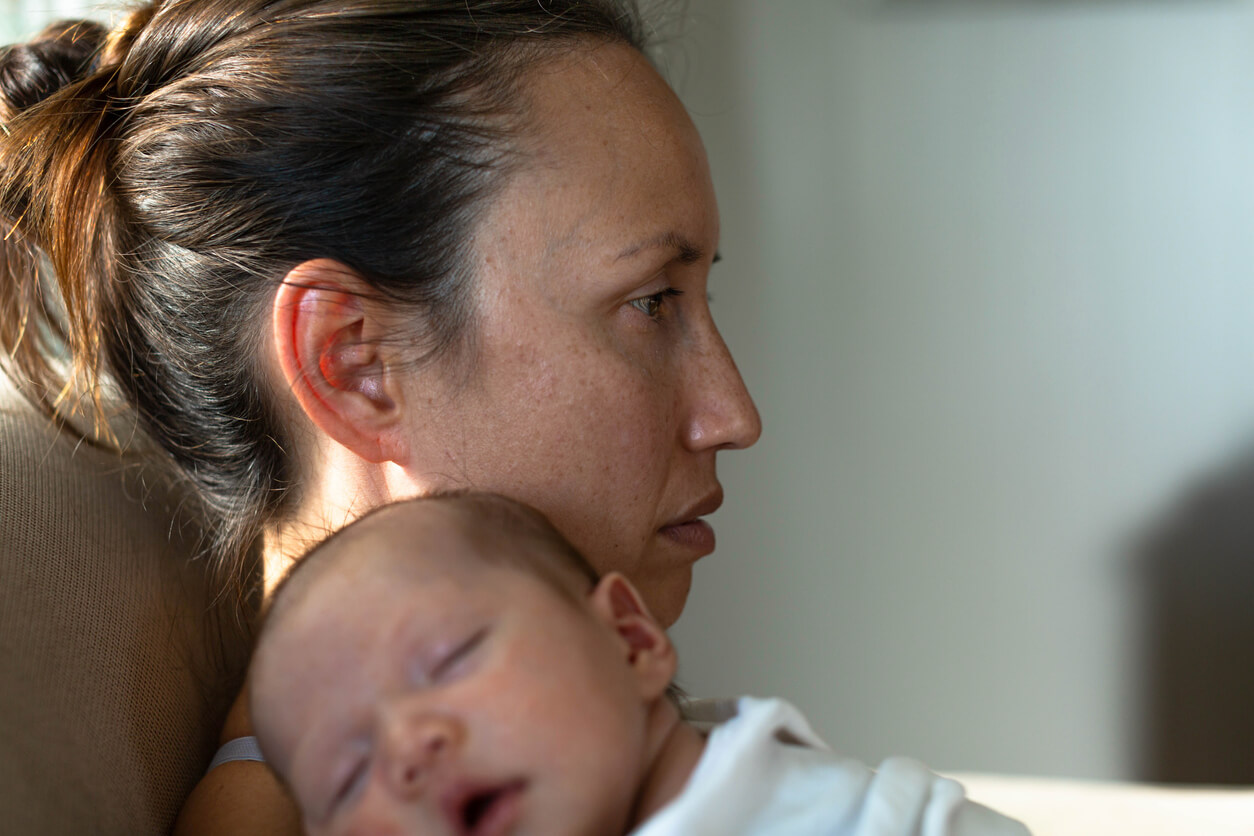Impulse Phobia: The Fear of Hurting Your Children

We know that, from the time you become a mother, your child becomes the most important thing to you. You adore them and look out for their well-being at all costs. However, sometimes you may be plagued by frightening thoughts and you can’t understand where they come from. These may include the possibility of harming your child. If this has happened to you, you’ve probably felt frightened and extremely guilty, but rest assured, this happens to many mothers and is known as impulse phobia.
In fact, it’s estimated that about 40% of mothers with postpartum depression have these kinds of thoughts. And, even if you don’t, you may have experienced them too. The reality is that you need not fear, as there’s no real risk of harming your little one with impulse phobia. It’s all about the adequate management of your mental content. Here’s why.
What is impulse phobia?
Impulse phobia arises from a thought about harming ourselves or someone else. In the case of motherhood, that usually revolves around hurting one’s own children. However, it’s important to explain that there’s really nothing special about these thoughts; it’s the impact on the woman that has them that’s really relevant.

Intrusive thoughts
Let’s keep in mind that a person usually has about 60,000 thoughts a day. Our mind is an incessant coming and going of ideas, most of which we don’t control. These automatic ideas aren’t deliberate and can be about all sorts of things. Some may be real and others not, and some may be aligned with who we are and others may be totally contrary.
To make a simile, we can say that the mind is like a radio in which music is constantly being played and we’re the listeners. That is, we don’t decide what is broadcast and we don’t always like all the songs.
So, normally, when people have intrusive and unpleasant thoughts (for example, about harming someone), they simply don’t give them any importance and move on to something else. They understand that this automatic thought doesn’t belong to them.
The problem arises when this thought causes so much impact and discomfort that we can’t take our attention away from it and it begins to condition our life.
Fear of hurting your children
In motherhood, and especially during the postpartum period, intrusive thoughts are very common and are often related to harming children. For example, as a mother cuts the bread for her child’s snack, she may think the following, “What if I stick the knife in my child now?” Or while a woman is holding her child in her arms in the living room, she may think, “What if I throw him out of the window?” or “What if I smother him with a pillow?”
Avoidance mechanisms shouldn’t be used
Of course, when such thoughts arise, they’re frightening. However, they have nothing to do with the woman’s real desires or intentions. The problem is that sometimes they frighten her so much that she ends up believing them to be true. In other words, she wonders whether she would really be capable of harming her child in some way.
As a result, the mother not only suffers tremendous anguish, fear, and guilt, but certain avoidance mechanisms are often set in motion. For example, she tries to spend as little time as possible with the child or tries never to be alone with the child because she perceives herself as a danger. This greatly limits her life and the exercise of motherhood, but the fear is greater.

What to do in this situation?
If you’ve had these kinds of ideas, the main thing you have to understand is that they’re very normal. We all have aberrant ideas that have nothing to do with who we are or our will. What happens in impulse phobia is that that thought has become obsessive, we’ve given it a credibility that it doesn’t have and it grows more and more as we give our attention.
The real problem is the woman’s interpretation of that thought. “Do I really want to do it?”, “Am I really going to do it?”. And the reality is, no.
The very fact that that idea seems atrocious to you causes you so much pain and so much fear speaks to how contrary it is to your true will. You know you would never do it, but perhaps you’re afraid of losing control of your behavior. In this regard, remember that no idea is a reality, and just because you think something doesn’t mean you’ll do it. In this regard, you can take into account the following tips:
- Don’t give credibility to the idea. You must understand that this thought doesn’t really belong to you. Then, you have to let it go, stop feeding it, and not give it credibility.
- Don’t give into avoidance. This measure only increases the problem. When you refuse to hold your baby or care for them alone, you enter a cycle that only gives power to that thought that was irrelevant to begin with.
- Face the fear. That way, you can see that you really do have control over your behavior.
Seek professional help to treat impulse phobia
Impulse phobia can appear in isolation, but also as part of some conditions such as postpartum depression, obsessive-compulsive disorder, or generalized anxiety. Therefore, you may need to seek professional help to manage this situation.
There are different degrees of severity. In some cases, just understanding that the thought isn’t yours and being sure not to avoid your child may reverse the impulse phobia. But it’s also possible, and legitimate, that you may need support and guidance during this process. So, stop blaming yourself or feeling like a bad mother, try to understand what’s happening, and ask for help if you need it.
We know that, from the time you become a mother, your child becomes the most important thing to you. You adore them and look out for their well-being at all costs. However, sometimes you may be plagued by frightening thoughts and you can’t understand where they come from. These may include the possibility of harming your child. If this has happened to you, you’ve probably felt frightened and extremely guilty, but rest assured, this happens to many mothers and is known as impulse phobia.
In fact, it’s estimated that about 40% of mothers with postpartum depression have these kinds of thoughts. And, even if you don’t, you may have experienced them too. The reality is that you need not fear, as there’s no real risk of harming your little one with impulse phobia. It’s all about the adequate management of your mental content. Here’s why.
What is impulse phobia?
Impulse phobia arises from a thought about harming ourselves or someone else. In the case of motherhood, that usually revolves around hurting one’s own children. However, it’s important to explain that there’s really nothing special about these thoughts; it’s the impact on the woman that has them that’s really relevant.

Intrusive thoughts
Let’s keep in mind that a person usually has about 60,000 thoughts a day. Our mind is an incessant coming and going of ideas, most of which we don’t control. These automatic ideas aren’t deliberate and can be about all sorts of things. Some may be real and others not, and some may be aligned with who we are and others may be totally contrary.
To make a simile, we can say that the mind is like a radio in which music is constantly being played and we’re the listeners. That is, we don’t decide what is broadcast and we don’t always like all the songs.
So, normally, when people have intrusive and unpleasant thoughts (for example, about harming someone), they simply don’t give them any importance and move on to something else. They understand that this automatic thought doesn’t belong to them.
The problem arises when this thought causes so much impact and discomfort that we can’t take our attention away from it and it begins to condition our life.
Fear of hurting your children
In motherhood, and especially during the postpartum period, intrusive thoughts are very common and are often related to harming children. For example, as a mother cuts the bread for her child’s snack, she may think the following, “What if I stick the knife in my child now?” Or while a woman is holding her child in her arms in the living room, she may think, “What if I throw him out of the window?” or “What if I smother him with a pillow?”
Avoidance mechanisms shouldn’t be used
Of course, when such thoughts arise, they’re frightening. However, they have nothing to do with the woman’s real desires or intentions. The problem is that sometimes they frighten her so much that she ends up believing them to be true. In other words, she wonders whether she would really be capable of harming her child in some way.
As a result, the mother not only suffers tremendous anguish, fear, and guilt, but certain avoidance mechanisms are often set in motion. For example, she tries to spend as little time as possible with the child or tries never to be alone with the child because she perceives herself as a danger. This greatly limits her life and the exercise of motherhood, but the fear is greater.

What to do in this situation?
If you’ve had these kinds of ideas, the main thing you have to understand is that they’re very normal. We all have aberrant ideas that have nothing to do with who we are or our will. What happens in impulse phobia is that that thought has become obsessive, we’ve given it a credibility that it doesn’t have and it grows more and more as we give our attention.
The real problem is the woman’s interpretation of that thought. “Do I really want to do it?”, “Am I really going to do it?”. And the reality is, no.
The very fact that that idea seems atrocious to you causes you so much pain and so much fear speaks to how contrary it is to your true will. You know you would never do it, but perhaps you’re afraid of losing control of your behavior. In this regard, remember that no idea is a reality, and just because you think something doesn’t mean you’ll do it. In this regard, you can take into account the following tips:
- Don’t give credibility to the idea. You must understand that this thought doesn’t really belong to you. Then, you have to let it go, stop feeding it, and not give it credibility.
- Don’t give into avoidance. This measure only increases the problem. When you refuse to hold your baby or care for them alone, you enter a cycle that only gives power to that thought that was irrelevant to begin with.
- Face the fear. That way, you can see that you really do have control over your behavior.
Seek professional help to treat impulse phobia
Impulse phobia can appear in isolation, but also as part of some conditions such as postpartum depression, obsessive-compulsive disorder, or generalized anxiety. Therefore, you may need to seek professional help to manage this situation.
There are different degrees of severity. In some cases, just understanding that the thought isn’t yours and being sure not to avoid your child may reverse the impulse phobia. But it’s also possible, and legitimate, that you may need support and guidance during this process. So, stop blaming yourself or feeling like a bad mother, try to understand what’s happening, and ask for help if you need it.
All cited sources were thoroughly reviewed by our team to ensure their quality, reliability, currency, and validity. The bibliography of this article was considered reliable and of academic or scientific accuracy.
- Abramowitz, J. S., Schwartz, S. A., & Moore, K. M. (2003). Obsessional thoughts in postpartum females and their partners: content, severity, and relationship with depression. Journal of Clinical Psychology in Medical Settings, 10(3), 157-164.
- Fairbrother, N., & Woody, S. R. (2008). New mothers’ thoughts of harm related to the newborn. Archives of women’s mental health, 11(3), 221-229.
This text is provided for informational purposes only and does not replace consultation with a professional. If in doubt, consult your specialist.








